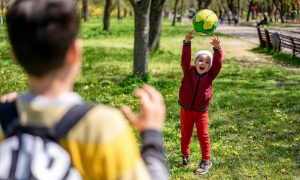Do Muslim parenting practices add value to today’s landscape?
The Muslim parent requires four critical kinds of knowledge to raise children successfully:
- General knowledge about Islam
- Parenting knowledge and skills based on the Qur’an and Sunnah
- Contemporary scientific, evidence-based knowledge about child development
- Knowledge about the impact of the environment on children’s attitudes and behaviours (1)
They are like the four legs of a chair. Take away one leg, the chair becomes unsteady. Remove one more leg, and the chair will wobble or worse, collapse. Religious beliefs are proven to influence both what parents want for their adolescents, and young people’s lifestyles. (2)
Overview
In Islam, every child is valued as a gift (3), raising children is an honourable trust, one to be undertaken seriously by both the mother and the father. The Prophet Muhammad (PBUH = Peace be Upon Him), the most revered personality for Muslims, showed that children and youths are to be treated with mercy, kindness, compassion and gentleness, to be tempered with firmness as and when appropriate. (4)
At-Tabarani reported that Abu Hurairah said that the Prophet took his grandson, alHasan’s hand and put his feet on the Prophet’s feet and told him to “Climb up.” The Prophet used the same approach with other people’s children. The Prophet used to line up Abdullah, Obaidullah and Kothair, the sons of Alabas, and asked them to run toward him, saying, “Whoever wins the race, I will give him such-and-such.” They used to come running and jump up to hug him, and he would kiss them. (4)
The Prophet also taught parents to be there for our children, to empathise with their happiness and pain. It was reported that Anas bin Malik r.a. said, “I have never seen anybody who is more merciful with children than the Prophet PBUH.” (3)
Some parenting principles based on Quran and Sunnah include: every soul is accountable for what it earns, be brief and use wisdom, choose the lesser of two evils, good deeds erase bad ones, teaching them hayaa’ (modesty, chastity, privacy education), using a holistic approach, teaching them respect, encouraging and emphasising positive actions and many more. (5)
Case for Action
Why do we need parenting knowledge and skills based on the Qur’an and Sunnah when there is an abundance of scientific, evidence-based research related to raising children? Muslims appreciate the value of various psychological theories and researches, but some of these resources pertaining to human development and behaviors are not in agreement on many issues and continually changing. What is missing is revelations from divine guidance that would guide them regardless. (6)
The Prophet PBUH taught us that raising children and youths is about touching their soul and awakening their conscience: “Two men came to the Prophet PBUH to resolve a dispute that occurred between them. The Prophet told them both, ‘I am a human being like you and when you ask for my judgement on an issue, and perhaps one of you is more eloquent and expressive in presenting his case, I may judge in his favour because of this, although the right may be with his counterpart. If I do this, I am giving him a piece of the hellfire and he is free to take it or leave it.’” (4)
This approach of evoking the conscience and nurturing personal integrity, accountability, honesty and trustworthiness is particularly relevant today in the digital era, when children and youths are continually bombarded by ideas, concepts and influences even when parents are not physically present.
Thoughts on Future Research
It would be helpful if more research is carried out to determine the value of Muslim parenting practices.
Here are my hypotheses:
– Parents who deliberately raised children/ youth with proactive Muslim parenting principles to nurture a solid Muslim identity have a significant degree of parenting success
– Muslim youth raised by practicing Muslim parents have less emotional and psychological problems growing up
– Muslim youth raised by practising Muslim parents have less behavioural problems compared to the average statistics
– Practicing Muslim parents who are aware of environmental influences and take proactive steps to deal with these are more likely to succeed in raising children who are balanced and more successful
– Practising Muslim parents who fail to take into account crucial parenting factors i.e. proactive Muslim parenting practices, environment factors, child development are less likely to succeed
Significance of Proposed Research
Muslim parenting skills focus on belief in the Unseen (e.g. God, angels, paradise, hell), character building, and intrinsic motivation. Muslim parenting based on Qur’an and Sunnah, if practised correctly, has the potential to transform the quality of parenting effectiveness, among both Muslims and non-Muslims.
According to Judi Mesman, Professor of Diversity in Parenting and Development, Leiden University, “The role of religion in parenting is rarely investigated systematically, and those studies that do examine how religion relates to parenting beliefs and practices, generally focus on Christianity.” (7) The proposed research is intended to prove that parents who deliberately raise children and youth based on the Quran and Sunnah are more likely to be successful, since they have a long term vision of nurturing children who would grow up to become positive agents for change for humanity.
The proposed research, if successfully undertaken, will validate the need to educate parents on how to raise children positively, based on the Qur’an and Sunnah. It will help to remove barriers to successful parenting, improve parental cognition and reduce parental stress once they are able to put into place better strategy choices (8), and empower parents with the confidence and expertise to raise children right. Parents will be more able to grow a parent-child relationship rooted in rapport and trust, thereby proactively inculcating positive behaviours and attitudes that work better in the long run e.g. delayed gratification related to gender relationships, avoiding risky behaviours including juvenile delinquency and premarital sex (9).
References
(1) Beshir, E. & Beshir, R. B. (2012). Answers to Frequently Asked Questions on Parenting (Part 3). Beltsville: amana publications.
(2) Horwath, J, Lees, J, & Sidebotham, P. (2016). The influence of religion on adolescent family life in England: an explanatory study of the views of young people and parents). Social Compass. Retrieved October 23, 2016 from Sage Journals. Retrieved October 22, 2016.
(3) The Holy Qur’an, Surah An-Nahl: 72.
(4) Beshir, E. & Beshir, R. B. (2007). Parenting Skills Based on The Qur’an and Sunnah. Beltsville: amana publications.
(5) Beshir, E. & Beshir, R. B. (2009). Parenting in The West: An Islamic Perspective. Beltsville: amana publications.
(6) Parent-Child Relations: A Guide To Raising Children. The International Institute of Islamic Thought, USA and UK.
(7) Mesman, J. (March 3, 2016). The Role of Islam in Parenting. What’s New?! Spring Lecture Series. University of Leiden.
(8) Padilla-Walker, L. M. “Peers I Can Monitor, It’s Media That Really Worries Me!”: Parental Cognitions as Predictors of Proactive Parental Strategy Choice. Journal of Adolescent Research. Retrieved October 22, 2016.
(9) Dollahite, D.C., Layton, E., Bahr, H. M., Walker, A. B., & Thatcher, J. Y. (2016). Giving Up Something Good for Something Better: Sacred Sacrifices Made by Religious Youth. Journal of Adolescent Research. Retrieved October 22, 2016.
[ends]







